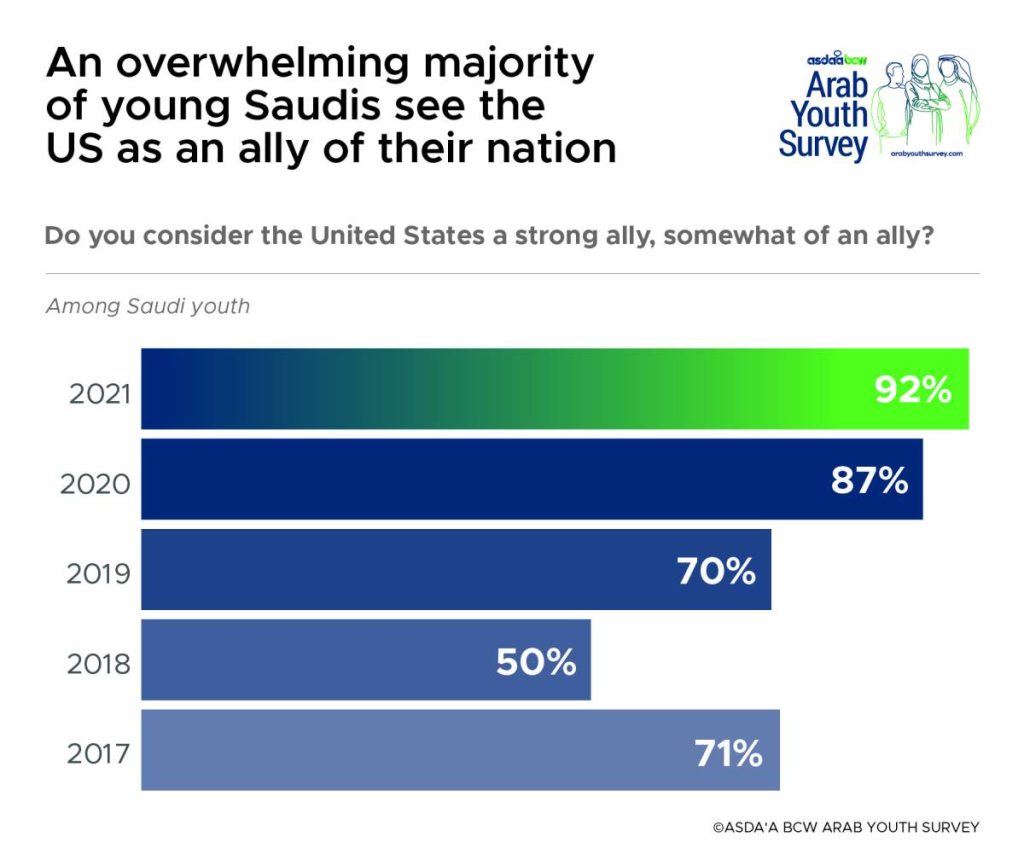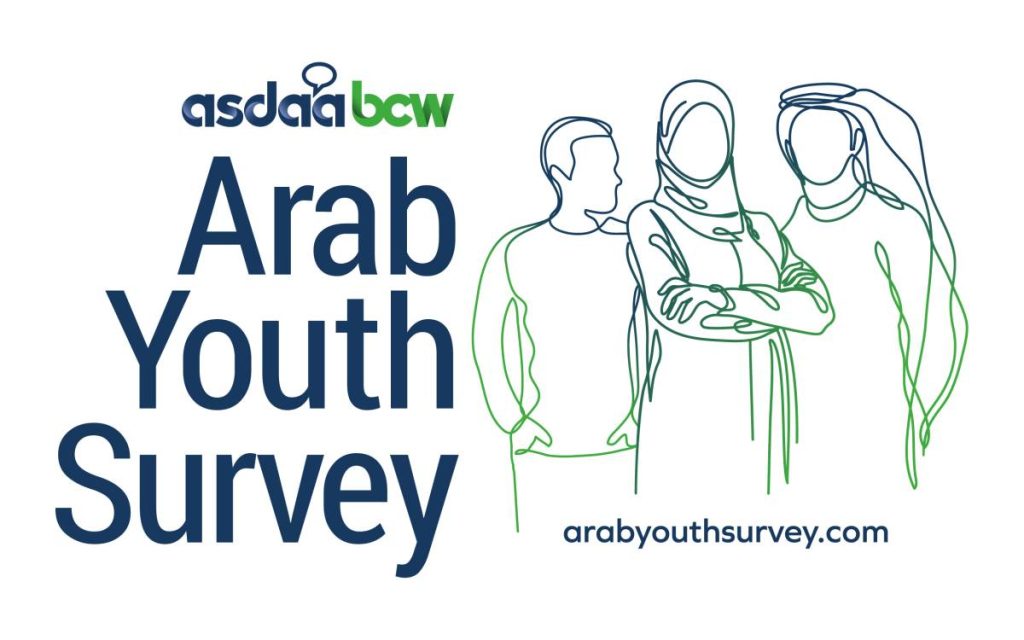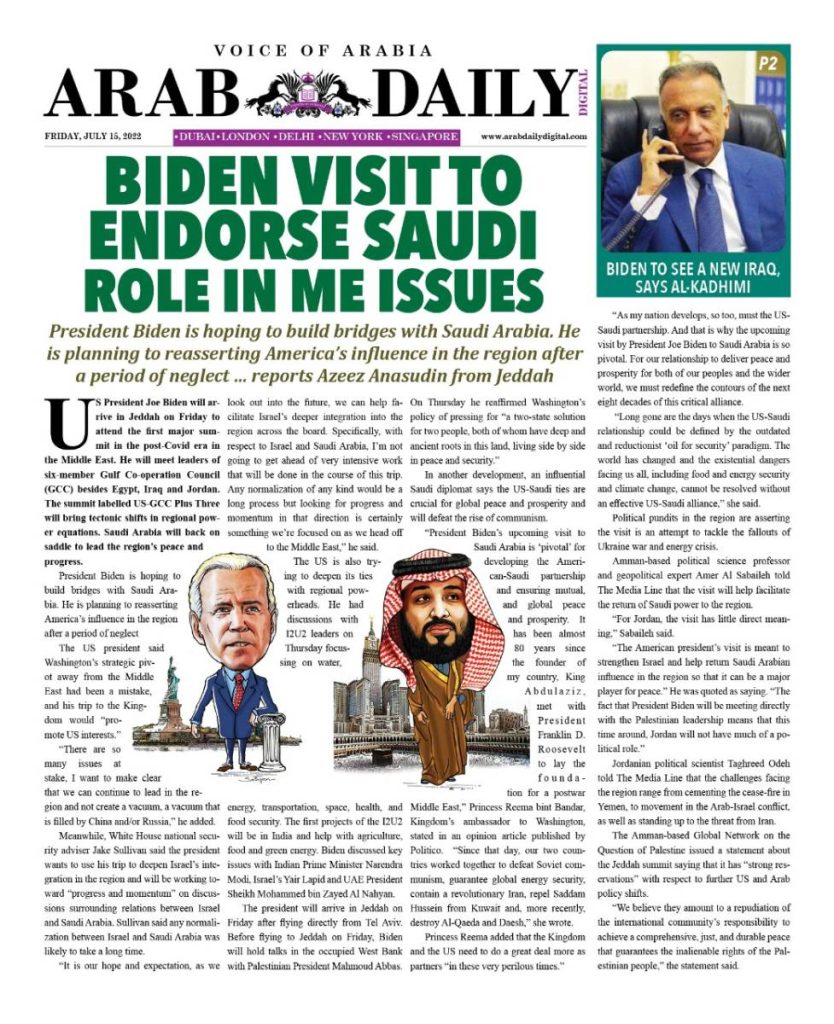ASDA’A BCW Arab Youth Survey shows that over 90% of Saudi youth see US as a strong ally of their nation. Two-thirds (63%) of Saudi youth say their country’s relations with the US will improve under President Biden
An overwhelming majority (92%) of young Saudis, who form about two-thirds of Saudi Arabia’s population, see the United States as an ally of their nation, with 59 per cent stating the US is a ‘strong ally’ and 33 per cent citing it as ‘somewhat of an ally.’
This finding from the 13th edition of the annual ASDA’A BCW Arab Youth Survey was released ahead of the the historic visit of US President Joe Biden to the Kingdom.
According to the survey, the perception that the US is an ally of Saudi Arabia is at its highest level in five years. In 2020, 87 per cent of Saudi youth viewed the US as a ‘strong ally’ or ‘somewhat of an ally’, an increase in favourability over 2019 when 70 per cent of Saudi youth viewed the US as an ally. In 2018, 50 per cent of Saudi youth viewed the US as an ally.
The symbolism of Biden’s arrival in the Kingdom, following his first official visit to Israel, will not be lost on young Saudis, three-quarters (75%) of whom believe addressing the ‘Palestinian-Israeli conflict’ should be a top priority for the Arab world.
Despite the broadly positive perception of President Biden, young Saudi men and women believe he has work to do on the Palestine-Israel question, with 93 per cent insisting his administration “should have a played a more active and unbiased role in resolving the conflict.” A majority of young Saudis (73%) are confident that the conflict is ‘very likely’ to ‘somewhat likely’ to be resolved in the next five years.

“The findings from our survey reflect the optimism surrounding Biden’s first visit to the Kingdom as the US president,” said Sunil John, President, MENA, BCW and Founder of ASDA’A BCW.. The generally warm feelings young people have towards US, and their eagerness for peace across the region, especially in resolving the Palestinian conflict, show the value to be had from a reset of US-Saudi relations to achieve a more stable and stronger Middle East geopolitical order.”
Underlining the strategic role of the US in the region, over one-third (36%) of young Saudis believe the US has the most influence in the Arab world among non-Arab nations, compared with 43 per cent of Saudi youth who say their own country is the most influential among Arab nations in the region.
Over two-thirds of young Saudis (63%) are also confident that their country’s relations with the US will improve under President Biden, while the rest (37%) believe relations between the two countries will remain the same.

Almost all young Saudis (97%) are confident that their country is going in the right direction; 82 per cent agreed with the statement that ‘our best days are ahead of us.’
For the largest-of-its-kind survey of the Arab world’s largest demographic, which was unveiled in October last year, PSB Insights, the global strategic research and analytics specialist, conducted 3,400 face-to-face interviews with Arab youth aged between 18 and 24 in 50 cities and territories in 17 states in the Middle East and North Africa (MENA) region from June 6-30, 2021.
The survey polled 202 young Saudis in Riyadh (40%), Jeddah (40%) and Dammam (20%) with the sample split equally between females and males. Of the young Saudi respondents, 41 per cent are in full-time education and 31 per cent in full-time work with the rest being either in parttime work (8%), unemployed (8%) or both studying and working (7%). Nearly half of the respondents were graduates.

The Annual ASDA’A BCW Arab Youth Survey, launched in 2008, is the largest survey of its kind of the Arab world’s largest demographic – its over 200 million youth. The survey fills an important gap in the data and insights on this influential community. It informs governments, the private sector, multilateral institutions, and academia on policymaking and future strategy. The 13th Annual ASDA’A BCW Arab Youth Survey 2021, conducted by the international research firm PSB Insights, explores the hopes, fears and aspirations of Arabs aged 18 to 24 across 50 cities and territories in 17 states in the Middle East and North Africa.
ALSO READ: Biden Reboots Arabia

